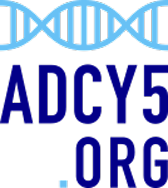Community
Grace’s Story
Hi! Can you start by sharing a little about yourself and your family?
My daughter Grace is 4 years old, has two older brothers and loves the colour pink. We live in Sydney, Australia, and Grace loves to go to the beach with her family. She has an ADCY5 world-first variant not reported in the literature before; c2087T>A .
Can you tell us about the first symptoms you noticed? When did you first realize there might be something different or unusual?
The first symptoms we noticed were floppiness and central hypotonia at about 4.5 months of age following a virus. We also noticed a mild tremor that started in her left hand, and at 6 months of age she could not sit up and had no head control (she would try to put food to her mouth and it would go to the top of her head). I took her to a pediatrician who said she had a global developmental delay, and that it would be okay, but after I kept going back, he then called it atypical Cerebral Palsy. I remember being so concerned, heartbroken and worried as I knew there was something wrong with my child.
What was your journey to getting a diagnosis? What specialists or testing did you go through, and how long did it take to get the result?
It was really hard, as we had to go to 3 neurologists and many health professionals before going to a rare disease neurologist and getting our diagnosis through genomic testing at 3.5 years old. It took a whole year of agonising waiting to get those genetic testing results. Grace has a de novo mutation of the ADCY5 gene. No other conditions are known at this stage.
Describe how you live with ADCY5‐related movement disorder (ADCY5‐RMD) day-to-day: how is your routine similar or different to others? What are some ‘wins’ and ‘lows’ right now?
Living with ADCY5‐related movement disorder (ADCY5‐RMD) is challenging, we are on a rollercoaster most days as Grace can be very different from one day to the next. She can sit independently for 2-3 minutes before falling backwards, is unable to stand or walk independently and requires full assistance with all activities of daily living. She is starting to talk more, with 2-3 words at a time, but it is so variable depending on the day; some days she may only say a few words. Perhaps the most frustrating part of living with this disorder is that cognitively she is very smart, and this leads to a huge degree of frustration. Emotions are big triggers for ADCY5 episodes, and this is the hardest thing to manage as Grace is affected by excitement, good or bad. This is also true of sickness, fatigue, etc., so her body can feel quite different from one day to the next. My biggest worries right now are how to overcome her fears: she has a fear of falling, and right now is trying desperately to get into a sitting position from the floor. When her agitation kicks in, her signals go everywhere and she's unable to coactivate her muscles. It's so heartbreaking to see your child struggle. She’s had small successes too, like increasing her vocabulary and starting to chat more since taking caffeine. Being able to stand and play at a bench was also made possible with caffeine. Going from sit-to-stand off a chair with minimal support behind her, feeding herself with a fork or spoon, and giving herself water from a straw have all been wins too.
“Emotions are big triggers for ADCY5‐related movement disorder (ADCY5‐RMD) episodes, and this is the hardest thing to manage as Grace is affected by excitement, good or bad.”
What are you excited about when you think of the future? How has your outlook changed (before and since the diagnosis), and what gives you hope?
I am excited to find out about other treatments that may help Grace. Perhaps ones that work on different pathways, like the A2A. I’m also excited for the possibility of gene therapy, as it’s had great results in AADC — for example helping children who had no head control sit independently, go down a slide and sit up in bed by themselves. I am very hopeful we will find something that gives all those suffering with ADCY5‐related movement disorder (ADCY5‐RMD) independence. Caffeine has been a game-changer, and has enabled us to do therapy to help with life skills. I am hopeful for treatments and cures as medical science is rapidly advancing at such a great pace. The fact they are doing so much work in the Parkinson's area is promising for ADCY5.
More Patient Stories
Djaro
Our son Djaro is 10, from Wekerom in the Netherlands, and has ADCY5 (the rest of the family isn't affected with ADCY5). Djaro loves playing video games!…
Lilly
Lilly is using her personal experience and writing abilities to be an advocate for the Rare Disease and disability communities. She is currently earning her Master of Arts…
Newly Diagnosed?
The most important thing our rare ADCY5‐related movement disorder (ADCY5‐RMD) community needs to do is come together to build knowledge and collect information.





